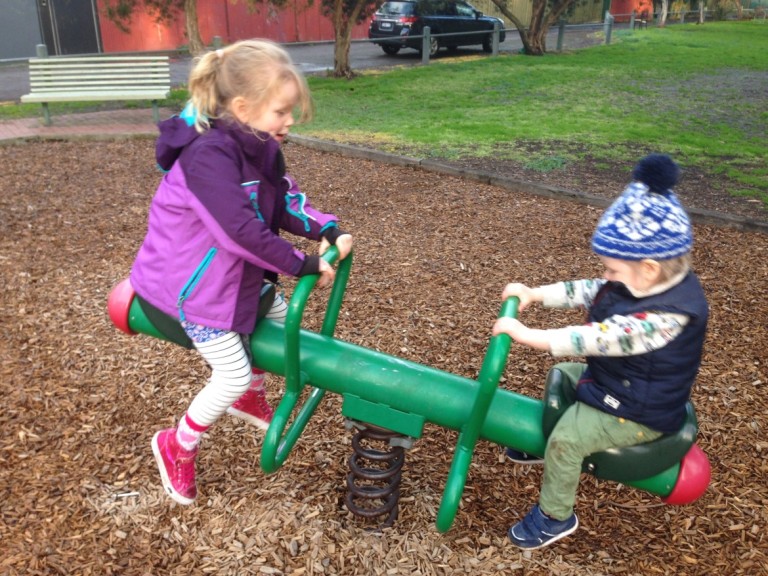There’s still a few weeks of warm weather before winter kicks in. Make the most of the warmth and the opportunities for outdoorsy fun!
We all know that outdoor and active play is vital for children’s development of motor skills – but playgrounds, parks and play centres are ALSO natural places for children to develop social language, listen to and learn a variety of language concepts. For example, they can learn to make new friend, greet, request, negotiate and take turns.
Playground Activity 1: Descriptive Vocabulary
Without a doubt, playgrounds and parks are gold star play spaces when it comes to talking to your child using lots of descriptive vocabulary. Play equipment has great (repetitive) attraction for kids and these repetitions are perfect for reinforcing language concepts while your child plays.
- Talk about where your child is (e.g. on the slide, up high, under the bridge, through the tunnel).
- Talk about what your child is doing (e.g. slithering through the tunnel, balancing on the beam, waiting for a turn on the swing, climbing up steps).
When the play equipment loses its appeal temporarily, you can start exploring the playground with your child.
- Talk about how things feel and sound (e.g. feeling the rough texture of the tree truck, hearing the crunchy leaves, feeling the sharp end of a stick, a heavy stone feeling the soft sand while you finger paint in it).
- Talk about comparative concepts such as soft/hard, long/short, noisy/quiet, rough/smooth (e.g. “My stick is smooth where the bark has come off. Can you find a rough one?”)
Playground Activity 2: Bubbles
Bubbles are cheap, fun and portable. Leave a wand in your car or handbag and you’re guaranteed to have a toddler who will happily blow them, chase them, jump up to them, watch them pop and of course, pop them themselves. They’re great for a day outdoors because you don’t have to worry about the mess either – bonus!
Bubbles are another great activity for getting those little feet moving and using language concepts at the same time.
- Encourage your child to tell you the type and direction of bubbles to blow (e.g. big bubbles up, little bubbles over the slide).
- Provide chances for them to listen and follow what you want them to do once you’ve blown the bubbles (e.g. stomp them, clap them, pop them, use one hand, use both hands, use your left foot, use your right hand).
- Use use descriptive vocabulary to talk to your child about the experience you’re sharing (e.g. bubbles are floating up, a bubble balancing your hand, bubbles falling to the ground).
For the early talker – you can use bubbles to encourage your child to request more bubble blowing – after a few turns of you blowing bubbles, just screw the lid on tightly and hand the bubbles back to your child and wait… If your child hands it back to you, they’ve just made a request! You can model the language they need to have that request met e.g. “Oh, you want me to blow bubbles? Ok, I’ll blow bubbles”.
Playground Activity 3: Listen up
Another crucial part of learning early language is the ability to follow directions. While you want to avoiding directing or controlling your child’s play, it is still a good idea to teach them to follow simple, new instructions.
Turn this into a fun, turn-taking game or for older children you can play ‘Simon Says’ with one/ two step instructions. For example, you can tell your child to “hop on one foot” or “run on the spot” and then “stop”, and then it’s their turn to give you an instruction. For older children, instructions can be longer and involve more steps e.g. Simon Says touch your nose and turn around.
With these activities, you might start to attract other children in the playground! Involving other children in play is a good opportunity to teach your toddler the important social skills of taking turns, waiting, requesting and more. “Can I have a turn? Can I play with you?”
Remember that these language activities don’t have to stop at the playground – take them home and use them in pretend play with toys you have at home or with siblings too!

